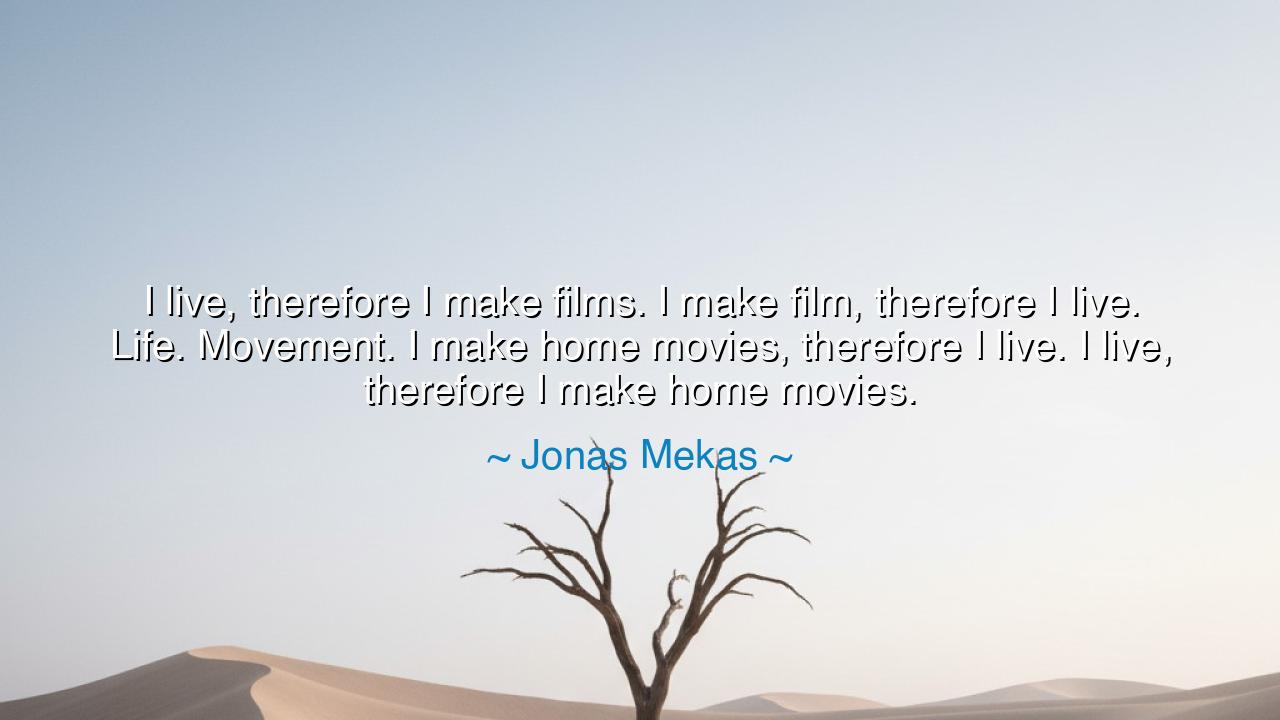
I live, therefore I make films. I make film, therefore I live.
I live, therefore I make films. I make film, therefore I live. Life. Movement. I make home movies, therefore I live. I live, therefore I make home movies.






The visionary filmmaker and poet Jonas Mekas, father of avant-garde cinema, once said: “I live, therefore I make films. I make film, therefore I live. Life. Movement. I make home movies, therefore I live. I live, therefore I make home movies.” In these looping words, he revealed not merely an artist’s statement, but a philosophy of existence — a truth that merges the act of creation with the essence of being. For Mekas, to live was to create, and to create was to reaffirm life itself. The two could not be separated, for each breathed life into the other, like the rhythm of the lungs or the beating of a heart.
Born in Lithuania, Mekas was not raised amidst the glitter of cinema, but amid the ashes of war. He was displaced, exiled, and uprooted — a man torn from home but forever searching for it through his lens. To him, the camera became both memory and salvation, a companion that allowed him to stitch meaning from fragments of time. His “home movies” were not trivial recordings, but sacred rituals of remembrance — gestures of love toward the fleeting beauty of life. Thus, when he said, “I live, therefore I make home movies,” he meant that the act of observing, recording, and cherishing the world was his way of holding onto existence itself.
The repetition in his words mirrors the eternal cycle of life and art, where creation feeds the spirit, and the spirit fuels creation. Each sentence folds back upon itself, like the seasons returning or the tides of the sea. In this repetition lies a kind of mantra — a meditation on continuity, a refusal to let the chaos of existence swallow the soul. For Mekas, filmmaking was not an industry, not even a craft; it was a form of prayer. Through his lens, the ordinary became sacred: a friend’s laughter, a snowfall, a fleeting glance of sunlight through leaves. These were not moments to be consumed — they were moments to be lived twice: once in life, and once in remembrance.
The ancients, too, knew this sacred union between creation and being. The sculptor Phidias, carving gods from stone, once said that when his chisel moved, he felt not his own hand, but the hand of life itself guiding him. The poet Rumi wrote, “When I am silent, I fall into the place where everything is music.” Mekas’s truth is born from this same lineage — the belief that art is not an ornament to life, but its purest expression. To create is to affirm one’s existence, to declare, “I was here, I saw, I felt, and I loved.” Without creation, life becomes hollow; without life, art becomes empty form.
Mekas’s devotion to his “home movies” is especially profound in its humility. He did not seek grand spectacles or vast epics; he found truth in the small, the intimate, the fleeting. He teaches us that beauty is not elsewhere — it is here, in the details we overlook. Every person, every gesture, every moment holds poetry if we dare to see it. His films remind us that the act of witnessing — of truly paying attention — is itself an act of creation. The artist does not invent meaning; he discovers it. He reveals what has always been sacred: the miracle of being alive, right now.
Through his lens, Mekas transformed exile into belonging. He found home not in a place, but in the act of seeing. This is why he speaks of “home movies” — for home, to him, was not a structure of brick or soil, but a tapestry of memories woven through the heart. Each film, each frame, was a home built from time itself, a sanctuary against forgetting. He shows us that when all else is taken — nation, language, certainty — the soul can still create, and in creation, find its refuge.
The lesson, then, is clear and radiant: live creatively, and create as a way of living. Do not wait for greatness or permission. Let your life itself be your art — your laughter, your kindness, your attention. Record what moves you, in whatever form your soul chooses — through words, sound, image, or silence. For every act of mindful creation is a declaration that life matters, that you have seen its light and wish to pass it on.
So remember the teaching of Jonas Mekas: to live is to create, and to create is to live. Do not let your days pass unrecorded in the heart. Take up your “camera,” whatever form it may take, and turn your gaze upon the world — its sorrows, its joys, its fragile grace. In every moment you choose to notice, to remember, to express, you whisper the same sacred vow: “I live, therefore I create. I create, therefore I live.” And thus, through creation, you too become eternal.






AAdministratorAdministrator
Welcome, honored guests. Please leave a comment, we will respond soon